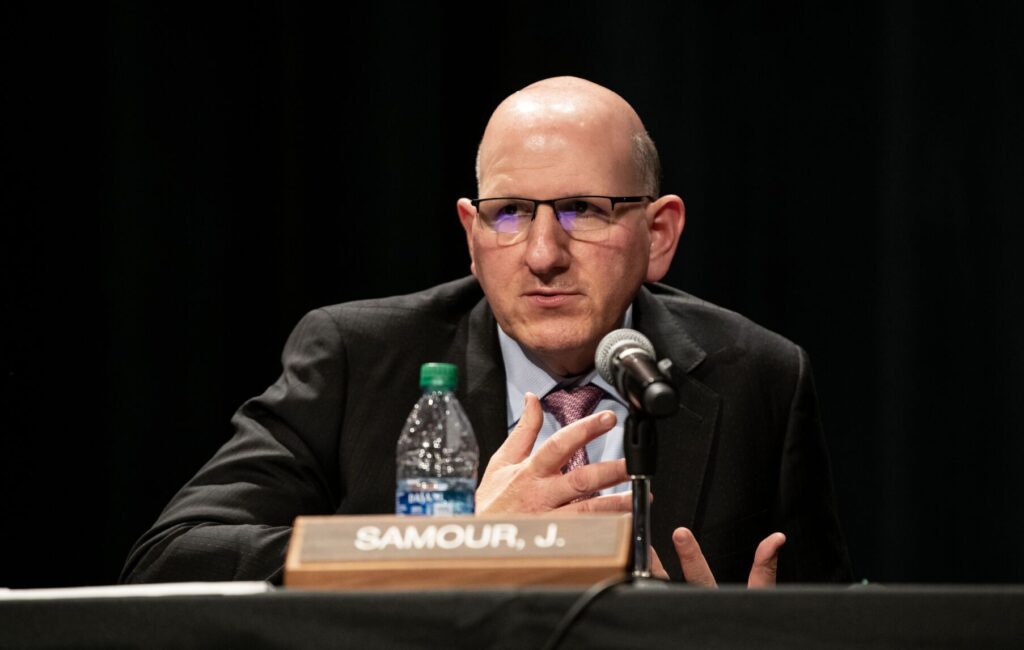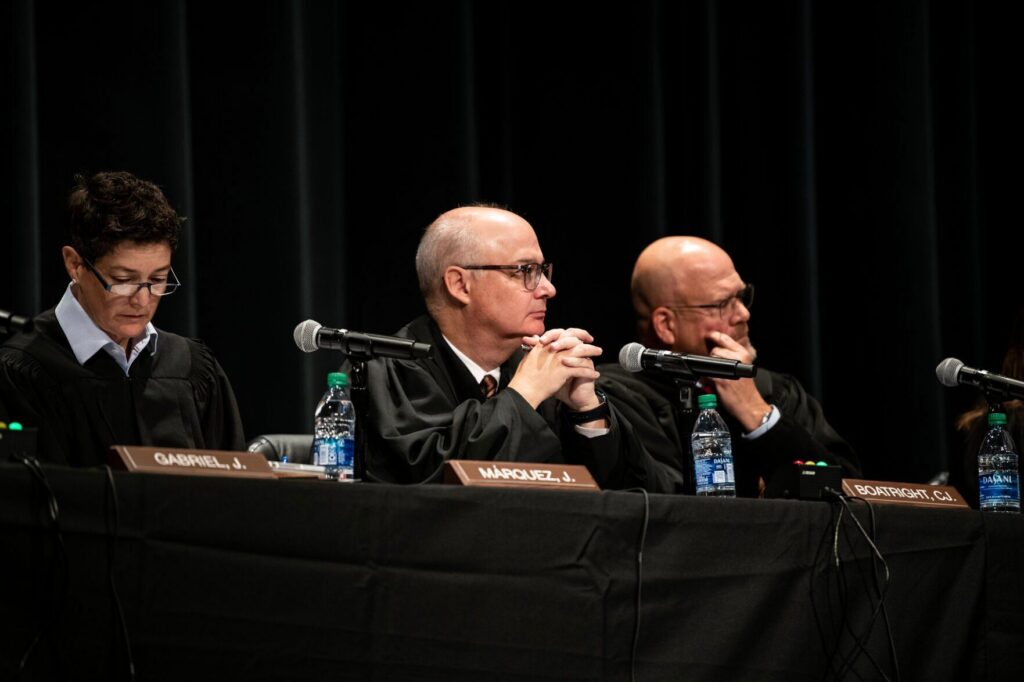COURT CRAWL | Judges go to school, Ukrainian war hits home for one judge

Welcome to Court Crawl, Colorado Politics’ roundup of news from the third branch of government. The state’s second-highest court conducted its business in front of a few dozen high school students last week, and amid the ongoing war, a top federal judge opened up about his visits to Ukraine to help the country improve its judiciary.
Courts in the Community
? Although the judges on the state’s Court of Appeals are usually the ones peppering people with questions, the tables were turned last week when three of them stood in front of a room of high school students and responded to curious inquiries about what it is like to be a judge. David J. Richman, Ted C. Tow III and Matthew D. Grove listened to two oral arguments in real cases at the STRIVE Prep – RISE charter school in northeast Denver, following it up with a question-and-answer session with students.
? Here are some things the audience wanted to know:
How do you remain so unbiased? “We don’t watch the trial. We don’t see people or make judgments about whether they looked shifty when they testified. … Being separated from what actually happened in trial by the fact that it’s written down in front of us avoids us judging things in a certain way that would cause us to have that kind of bias.” -Grove
How did the pandemic affect you? “It affected us far less (than the trial courts). What will affect us now is all of the trials that didn’t happen in the trial courts are now happening. So we’re going to get a very large rat in the snake’s belly coming our way quickly.” -Tow
How do emotions affect you? How do you cope with having to handle those emotions? “One of the reasons this court is here is, let’s assume a case where there is no doubt that the person is guilty. He’s on video doing it. It doesn’t matter. Even the most guilty person deserves a fair trial where the rules are followed. That’s our job: to make sure the rules were followed.” -Tow
? Tow also preemptively answered whether the judges wear pants under their robes (yes, they do).
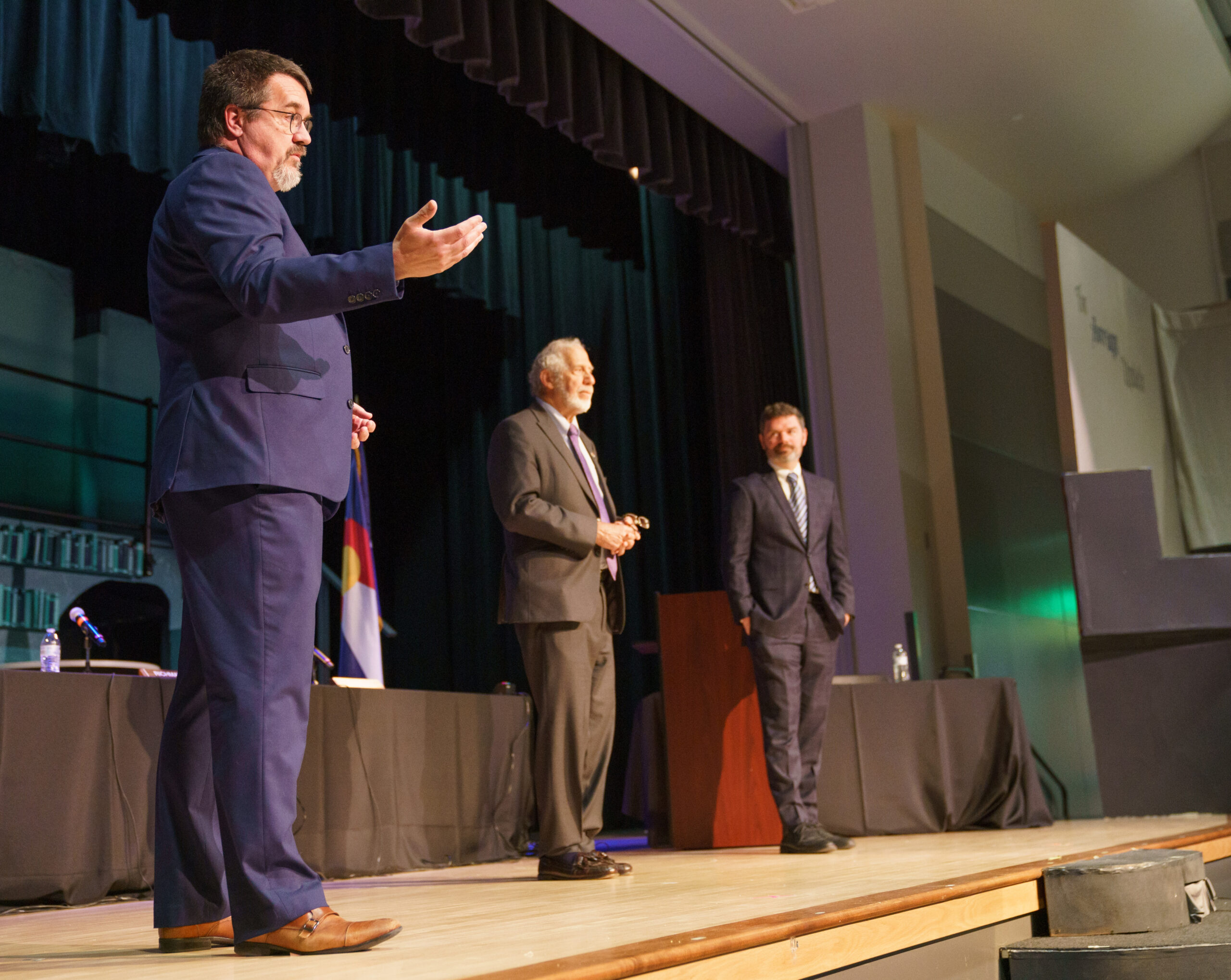
? The Courts in the Community program began in 1986, taking the Court of Appeals and the state Supreme Court to various venues across the state to hear cases. Each court conducts oral arguments in the community in the fall and the spring, and the Supreme Court’s next excursion will be on May 5 in Grand Junction.
? Colorado Politics did notice a disconnect between the audience at STRIVE Prep – RISE, where more than 90% of the student body are children of color, and the participants in the oral arguments. All three judges and four attorneys on stage were white men.
? The Judicial Department has bragged in recent months about its diversity efforts, with Justice Monica M. Márquez even vouching for the various initiatives to a congressional subcommittee. A Judicial Department spokesperson had this to say about the demographic disparity between the audience and presenters:
“Diversity on the bench and in the legal community has been a priority for the Judicial Department for many years and we recognize there’s work left to do. Cases are assigned randomly to divisions of the Court of Appeals, and cases for Courts in the Community are selected in part based on what the Court believes students will find interesting and on which cases are ready for argument on the date of a school visit. We hope the students got a lot of educational benefit from the visit – and that maybe we inspired some to look into legal careers.” –Jon Sarché, deputy public information officer
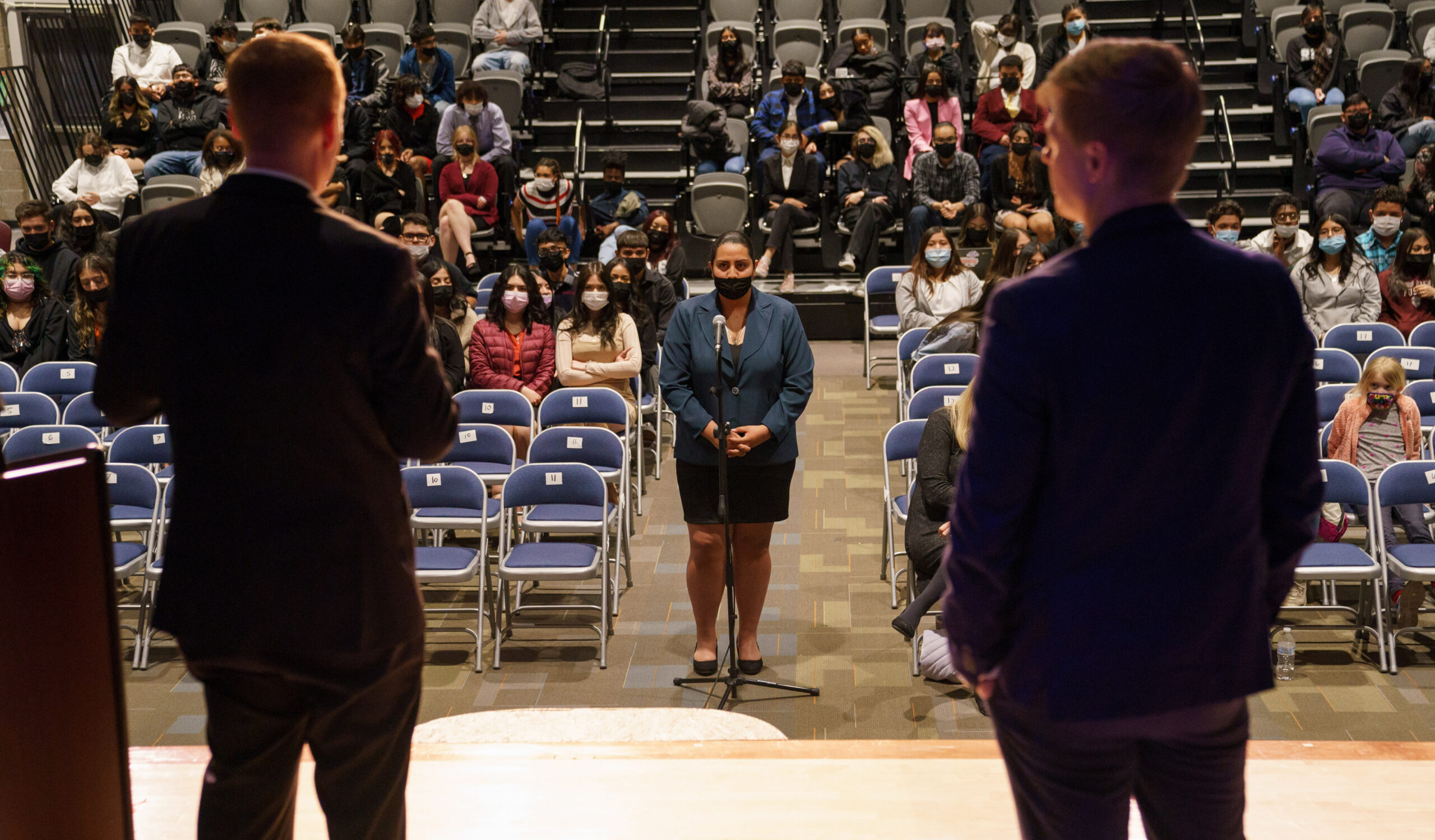
Overturned on appeal
? Speaking of the Court of Appeals, a three-judge panel found an Adams County judge misapplied the legal standard in declining to release a woman from state supervision. Although the trial judge noted that the woman’s risk to the community was “unknown” if she stopped taking her psychiatric medication, the panel said that all evidence actually pointed to there being little to no risk.
? A Russian-speaking suspect appeared to not fully grasp his constitutional right to have a court-appointed attorney before and during his interrogation, prompting the Court of Appeals to order a new trial on his murder charge.
Personal ties to the war in Ukraine
? Chief Judge Timothy M. Tymkovich of the U.S. Court of Appeals for the 10th Circuit has visited Ukraine four times since taking the bench in 2003. He met his extended family, learned about his roots and talked with Ukrainian judges about western-style judicial norms. Tymkovich had planned to return this year, but then Russia chose to invade its neighbor to the west. In an interview with Colorado Politics, Tymkovich talked about his experiences with Ukraine and his hopes for judicial reform there.
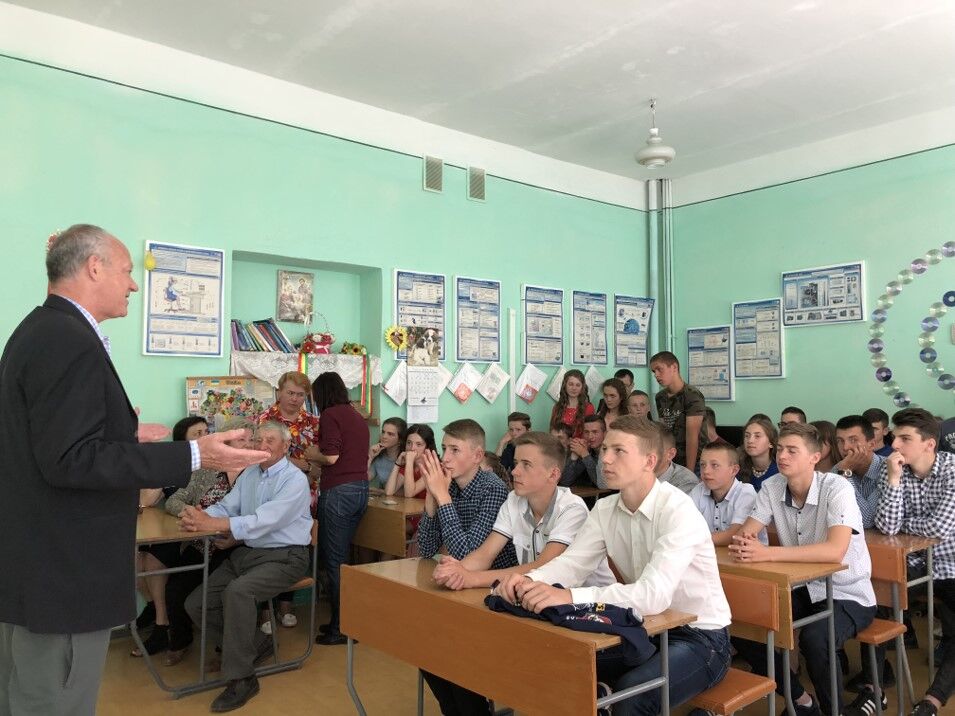
Elections in the courts
? A Republican candidate for the 7th Congressional District is suing to get on the primary ballot after he didn’t turn in the required number of valid signatures.
? Another Republican candidate for the 5th Congressional District believes his name on the primary ballot should include an anti-Joe Biden catchphrase, and has filed a lawsuit to that effect.
? A federal judge found the allegations were insufficient to establish that a group openly doubtful of the 2020 election results was engaging, at this moment, in voter intimidation. But a hearing on the matter is forthcoming.
Vacancies and appointments
? The governor has three candidates to choose from to fill the seat of Rio Grande County Court Judge Barbara A. Zollars: Mark I. Loy and John W. Stenger of Del Norte, and Trayson N. Stephany of Lakewood.
? One announcement from the First Judicial District Attorney’s Office (Jefferson and Gilpin counties): People with warrants for non-violent, low-level misdemeanors and traffic offenses will be able to resolve their cases without arrest on April 30 between 9:30 a.m. and 5:30 p.m. at the Jefferson County Probation Remington Building.

10th Circuit update
? Two cases implicating racial bias made their way through the 10th Circuit last week. A three-judge panel determined that a Black woman who worked in juvenile corrections could not sue her supervisor for a hostile work environment, despite being called the N-word and a “Black bitch” by the inmate who assaulted her.
? Even though three African/Caribbean immigrants were on trial for immigration-related crimes, the case wasn’t so tied to race that jurors had to be questioned about their racial biases before being seated, a panel ruled.
Miscellaneous decisions
? A federal judge in Colorado said he saw no need to transfer a Colorado Springs man’s lawsuit to Louisiana, where he alleges immigration guards beat him up and gave him COVID-19 in detention.
? In the continued fallout from revelations that a federal judge presided over cases despite having financial conflicts of interest, one of his colleagues took the unusual move of reviewing a case unprompted to determine that nothing nefarious happened.
? Although a retired public employee wanted to stop his ex-wife from receiving his retirement benefits, the Colorado Supreme Court said sorry, a trial judge has to agree to remove her first.
? A man who shot his terminally-ill wife in the head instead of following Colorado’s aid-in-dying law wasn’t entitled to defend himself by saying he had the victim’s consent, the Court of Appeals decided.






